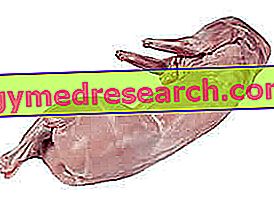During pregnancy the correct functionality of the maternal thyroid is essential to guarantee the health of the pregnant woman and the correct development, especially of the brain, of the unborn child. This is a period of new and continuous adaptations for the body of the future mother, and even the thyroid, since conception, is better prepared to welcome and support the new life.
Physiology of the maternal thyroid during pregnancy
Pregnancy is a period of increased functional load for the thyroid, which is forced to increase the synthesis of thyroid hormones due to:
of the strong stimulus on the synthesis of thyroxine-binding globulin ( Thyroxine-Binding Globulin, TBG) exerted by placental estrogens, which among other things also slow down hepatic catabolism; the increased levels of TBG and the consequent reduction of the metabolically active free fraction of thyroid hormones impose a compensatory increase in the synthesis of these hormones; consequently the levels of TSH, the hypothalamic hormone that stimulates the thyroid gland to increase the synthesis and secretion of thyroid hormones, increase; ultimately, during a physiological pregnancy we will see slightly increased TSH levels, high levels of TBG and total thyroxine (quantitatively the most important thyroid hormone) and normal free thyroxine levels; we remember how the concentration of estrogens (above all of the placental estriol) constantly increases during the pregnancy;
the increased plasma volume with an increase in the amount of circulating blood; this results in a greater dilution of substances circulating in the blood, including thyroid hormones, which consequently must be synthesized in greater quantities to keep the plasma concentration stable; the expansion of blood and interstitial fluids continues throughout the pregnancy;
placental desioactive activity, due to an enzyme (iodothyronine-type III monodesiodase) which inactivates maternal thyroid hormones; also in this case a compensatory increase in the synthesis of thyroid hormones is required; the placenta volume tends to increase from the third month of pregnancy until the end of gestation;
from the binding of the chorionic gonadotropin (HCG) to the thyroid receptors of the TSH, guaranteed by the structural analogies between the two hormones;


In light of what has been described, it is estimated that during pregnancy the synthesis of thyroid hormones undergoes an average increase varying from 40 to 60% (quota that reflects the increase in the dosages of L-thyroxine normally suggested in replacement therapy of gestational atyride, then without thyroid); since this synthesis requires the presence of adequate quantities of iodine, the requirement of the mineral increases significantly during pregnancy, also thanks to the increased renal clearance of the same (due to the increase in renal blood flow and glomerular filtration rate) and to the quota made available to the fetus for its development.
The volumetric increase of the maternal thyroid during an physiological pregnancy is estimated at around 13%, while the iodine requirement increases by about 50-60%.
Thyroid dysfunction in pregnancy: what risk for the unborn child?
From the early stages of embryogenesis, maternal thyroid hormones are indispensable for the growth of many tissues, in particular for the differentiation and maturation of the central nervous system. With the continuation of pregnancy, the hypothalamic-pituitary-fetal thyroid axis develops and from this point of view the fetus gradually acquires greater independence from the mother; not surprisingly, the placenta acts as a barrier against thyroid hormones and TSH, opposing their free exchange between the maternal compartment and the fetal compartment. In this regard, it is estimated that the fetus acquires the ability to synthesize thyroid hormones around the 10th to 12th week of gestation; it is therefore essential that during the first trimester of pregnancy the mother presents adequate concentrations of thyroid hormones in her own blood.
While in adults it is believed that the amount of iodine needed to maintain normal thyroid function is at least 150 μg a day, during pregnancy the recommended iodine intake rises to 220-250 µg / day; in the presence of insufficient amounts of iodine the synthesis of thyroid hormones is compromised, the plasma levels of the same are insufficient (this is called hypothyroidism ) and the levels of hypothalamic TSH increase, in a desperate attempt to stimulate the gland endocrine activity. Under this stimulus. the thyroid undergoes a volumetric increase, commonly called goiter, which during pregnancy affects above all pregnant women who live in areas with iodine deficiency not compensated by specific additions (such as iodized salt). The iodine deficiency is also negatively reflected on the fetal thyroid, which, like the maternal thyroid needs the mineral for the synthesis of the aforementioned hormones.
The importance of thyroid hormones for correct fetal development is obvious in cases of congenital cretinism, due to failure to develop fetal thyroid: the children who are affected are characterized by pathological bone and joint development, associated with dwarfism and deaf-mutism, with characteristic appearance: lips and eyelids particularly thickened, tongue out, scaly skin, very developed head, corrugated forehead and half-open mouth. Without arriving at these borderline cases, moreover almost disappeared from the developed countries thanks to the screening programs, we have seen how the women suffering from subclinical hypothyroidism run a greater risk of giving birth to children with intelligence defects and learning disabilities more or less marked. Other possible complications of untreated maternal hypothyroidism include: pregnancy hypertension with or without preeclampsia, placental detachment, low birth weight, birth of dead fetus, congenital malformations, postpartum hemorrhage.
On the other hand we have the opposite condition, namely the excessive concentration of thyroid hormones in the blood of the pregnant woman, better known as hyperthyroidism . Gestational hyperthyroidism is associated with an increased risk of preeclampsia, premature birth, placental abruption, fetal or perinatal death and low birth weight. The most common cause of hyperthyroidism during pregnancy is Graves-Basedow disease, which leads to the development of autoantibodies against the TSH receptor by stimulating the endocrine activity of the thyroid gland.
For all these reasons, women who are planning to become pregnant should perform thyroid screening before or at the beginning of gestation. For this purpose we recommend the dosage of TSH, Anti-TPO antibodies and possibly the free quota of T3 and T4. Only in this way, thanks to modern pharmacological therapies, women suffering from thyroid abnormalities will be able to live their pregnancy with serenity, avoiding the risk of adverse effects on the fetus.



